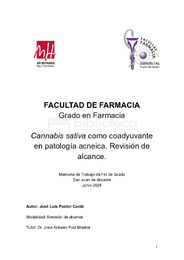Resumen :
ANTECEDENTES: El acné vulgar es una condición dermatológica común que
afecta a muchas personas en todo el mundo. Los tratamientos convencionales,
como productos tópicos y medicamentos recetados, tienen limitaciones en su
eficacia, tolerabilidad y efectos secundarios. Esto ha llevado a buscar
alternativas terapéuticas innovadoras, como los fitocannabinoides del cannabis,
conocidos por sus propiedades antiinflamatorias, antimicrobianas y reguladoras
del sebo.
OBJETIVO: El objetivo principal de este trabajo es revisar la literatura científica
sobre el potencial terapéutico del cannabis y sus componentes en el manejo
del acné vulgar. Se evaluará la viabilidad de incorporar el cannabis como
complemento o alternativa a las terapias convencionales, así como su eficacia
y seguridad en el tratamiento del acné.
METODOLOGÍA: Se realizó una revisión bibliográfica utilizando el método
PICO para identificar estudios relevantes sobre el uso de productos tópicos
derivados del cannabis en el tratamiento del acné vulgar. Se consultaron bases
de datos como MEDLINE, Embase, Scopus, Web of Science y Google Scholar
para recopilar información actualizada.
CONCLUSIONES: Los estudios revisados indican que los fitocannabinoides del
cannabis, especialmente el CBD, tienen propiedades beneficiosas para el
tratamiento del acné vulgar. Estos compuestos pueden modular la actividad de
los sebocitos, inhibir la producción de sebo, reducir la inflamación y equilibrar la
piel. Aunque la investigación está limitada por restricciones legales, los
resultados preliminares apoyan la necesidad de seguir explorando los
beneficios potenciales del cannabis en el tratamiento del acné.
BACKGROUND: Acne vulgaris is a highly prevalent dermatological condition
affecting many individuals worldwide. Despite the availability of conventional treatments
such as topical products and prescription medications, there are limitations in their
efficacy, tolerability, and side effects. This has driven the search for innovative
therapeutic alternatives, such as the use of phytocannabinoids derived from cannabis,
known for their anti-inflammatory, antimicrobial, and sebum-regulating properties.
OBJECTIVE: The main objective of this thesis is to review the scientific literature on
the therapeutic potential of cannabis and its components in the management of acne
vulgaris. It aims to analyze the feasibility of incorporating cannabis as a complement or
alternative to existing conventional therapies, evaluating its efficacy and safety in acne
treatment.
METHODOLOGY: A literature review was realized using the PICO method
(Population, Intervention, Comparison, Outcomes) to identify relevant studies on the
use of cannabis-derived topical products in the treatment of acne vulgaris. Various
databases, such as MEDLINE, Embase, Scopus, Web of Science, and Google Scholar,
were consulted to gather updated scientific information on the topic.
CONCLUSIONS: The reviewed studies suggest that the phytocannabinoids present
in cannabis, especially CBD, have beneficial properties for the treatment of acne
vulgaris. These compounds can modulate sebocyte activity, inhibit sebum production,
reduce inflammation, and restore skin balance. Despite research limitations due to
legal restrictions, preliminary results support the need for continued exploration of the
potential benefits of cannabis in acne treatment.
|
 La licencia se describe como: Atribución-NonComercial-NoDerivada 4.0 Internacional.
La licencia se describe como: Atribución-NonComercial-NoDerivada 4.0 Internacional.
.png)
